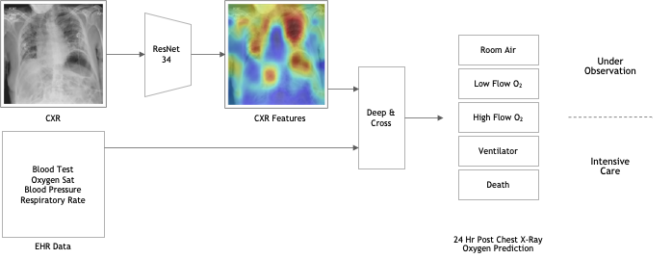Researchers at NVIDIA and Massachusetts General Brigham Hospital have developed an AI model that determines whether a person showing up in the emergency room with COVID-19 symptoms will need supplemental oxygen hours or even days after an initial exam.
The original model, named CORISK, was developed by scientist Dr. Quanzheng Li at Mass General Brigham. It combines medical imaging and health records to help clinicians more effectively manage hospitalizations at a time when many countries may start seeing a second wave of COVID-19 patients.

To develop an AI model that doctors trust and that generalizes to as many hospitals as possible, NVIDIA and Mass General Brigham embarked on an initiative called EXAM (EMR CXR AI Model) the largest, most diverse federated learning initiative with 20 hospitals from around the world.
In just two weeks, the global collaboration achieved a model with .94 area under the curve (with an AUC goal of 1.0), resulting in excellent prediction for the level of oxygen required by incoming patients. The federated learning model will be released as part of NVIDIA Clara on NGC in the coming weeks.
Looking Inside the ‘EXAM’ Initiative
Using NVIDIA Clara Federated Learning Framework, researchers at individual hospitals were able to use a chest X-ray, patient vitals and lab values to train a local model and share only a subset of model weights back with the global model in a privacy-preserving technique called federated learning.
The ultimate goal of this model is to predict the likelihood that a person showing up in the emergency room will need supplemental oxygen, which can aid physicians in determining the appropriate level of care for patients, including ICU placement.
Dr. Ittai Dayan, who leads development and deployment of AI at Mass General Brigham, co-led the EXAM initiative with NVIDIA, and facilitated the use of CORISK as the starting point for the federated learning training. The improvements were achieved by training the model on distributed data from a multinational, diverse dataset of patients across North and South America, Canada, Europe and Asia.
In addition to Mass Gen Brigham and its affiliated hospitals, other participants included: Children’s National Hospital in Washington, D.C.; NIHR Cambridge Biomedical Research Centre; The Self-Defense Forces Central Hospital in Tokyo; National Taiwan University MeDA Lab and MAHC and Taiwan National Health Insurance Administration; Tri-Service General Hospital in Taiwan; Kyungpook National University Hospital in South Korea; Faculty of Medicine, Chulalongkorn University in Thailand; Diagnosticos da America SA in Brazil; University of California, San Francisco; VA San Diego; University of Toronto; National Institutes of Health in Bethesda, Maryland; University of Wisconsin-Madison School of Medicine and Public Health; Memorial Sloan Kettering Cancer Center in New York; and Mount Sinai Health System in New York.
Each of these hospitals used NVIDIA Clara to train its local models and participate in EXAM.
Rather than needing to pool patient chest X-rays and other confidential information into a single location, each institution uses a secure, in-house server for its data. A separate server, hosted on AWS, holds the global deep neural network, and each participating hospital gets a copy of the model to train on its own dataset.
Collaboration on a Global Scale
Large-scale federated learning projects also are underway, aimed at improving drug discovery and bringing AI benefits to the point of care.
Owkin is teaming up with NVIDIA, King’s College London and more than a dozen other organizations on MELLODDY, a drug-discovery consortium based in the U.K., to demonstrate how federated learning techniques could give pharmaceutical partners the best of both worlds: the ability to leverage the world’s largest collaborative drug compound dataset for AI training without sacrificing data privacy.
NVIDIA CEO Jensen Huang described how AI can speed drug discovery in a portion of his GTC keynote below.
King’s College London is hoping that its work with federated learning, as part of its London Medical Imaging and Artificial Intelligence Centre for Value-Based Healthcare project, could lead to breakthroughs in classifying stroke and neurological impairments, determining the underlying causes of cancers, and recommending the best treatment for patients.
Learn more about another AI model for COVID-19 utilizing a multinational dataset in this paper, and about the science behind federated learning in this paper. And watch NVIDIA’s Huang recap all the news at GTC in the video below.